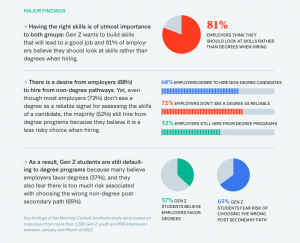![]() Advance CTE’s “Research Round-Up” series features summaries of relevant research reports and studies to elevate evidence-backed Career Technical Educational (CTE) policies and practices, as well as topics related to college and career readiness. This month’s topic, Alternative Credentials, advances a vision for the future of CTE where statewide systems and supports are in place for each learner’s skills to be fully counted, valued, and portable, and highlights the potential benefits of alternative credentials for both learners and employers.
Advance CTE’s “Research Round-Up” series features summaries of relevant research reports and studies to elevate evidence-backed Career Technical Educational (CTE) policies and practices, as well as topics related to college and career readiness. This month’s topic, Alternative Credentials, advances a vision for the future of CTE where statewide systems and supports are in place for each learner’s skills to be fully counted, valued, and portable, and highlights the potential benefits of alternative credentials for both learners and employers.
Defining Alternative Credentials
According to the Society for Human Resource Management, alternative credentials can be loosely defined as any micro-credential, industry or professional certification, acknowledgment of apprenticeship (registered or non-registered), or badging that indicates one’s competencies and skills within a particular field. Other common characteristics of alternative credentials include:
- These credentials typically take less time to complete;
- Focus on specific skills;
- Are stackable;
- Are verifiable; and
- Are often aligned to industries and can be frequently delivered digitally.
The key takeaways from three recent reports on the perceptions and outcomes of alternative credentials suggest that skills-based hiring offers a competitive alternative to the traditional, four-year degree job requirement and benefits both employers and employees.
Research shows a growing need to think outside of the traditional four-year degree.
Jobs for the Future (JFF) and American Student Assistance (ASA)’s white paper, “Degrees of Risk: What Gen Z and Employers Think About Education-to-Career Pathways…and How Those Views are Changing”, illustrates the shifting perceptions of alternative credentials
- When trying to determine their next steps after graduation, Generation Z youth are becoming increasingly wary of the cost and time to complete a traditional four-year degree. Almost 86 percent of learners today receive financial aid; the average student loan balance accumulated over four years ranges from $25,880 to $107,520. Knowing this, they are open to the idea of non-degree pathways and credentials to help build job readiness skills in order to accelerate their timelines for entering the workforce.
- Employers who are willing to look outside of the traditional four-year degree are looking for a certain threshold of experience (typically measured in years) to satisfy skill requirements. This could suggest that potential candidates who have completed an apprenticeship or work-based learning have an advantage over traditional college applicants who may not yet have accumulated work experience.

For employees, alternative credentials may have a return on investment that is competitive with the traditional degree track.
The Midwest Economic Policy Institute co-authored “Apprenticeship as a Career Development Alternative” with the University of Illinois’ Labor and Employment Relations division to examine registered apprenticeship programs in the state of Wisconsin. The report analyzes enrollment, hours worked, and wages earned by learners, to demonstrate the market value of alternative credentials when learners are considering their postsecondary options.
- Wages earned by workers who have achieved journey-level experience start at $67,200 annual salary, on par with annual earnings for workers with bachelor’s degrees.
- The average construction worker who completes an apprenticeship program in Wisconsin earns 33 percent more than the average worker with an associate degree. These wages are only 3 percent less than the average worker with a bachelor’s degree and avoid incurring $27,100 in student debt, the average loan burden for graduating seniors from the University of Wisconsin-Madison.
For employers, lowering barriers to jobs by removing burdensome degree requirements has the potential of diversifying talent pools.
The Society for Human Resource Management (SHRM) published the findings of a survey sampling executives, supervisors, HR professionals, and workers to measure the frequency and perceptions of alternative credentials. A majority of executives, supervisors, and HR professionals believe that including alternative credentials in hiring decisions can actually improve overall workplace diversity. The findings show that 81 percent of executives, 71 percent of supervisors, and 59 percent of human resource professionals recognize that using alternative credentials can uncover untapped talent and make it easier for diverse candidates to obtain employment.
Credentials are popular with nontraditional groups:
- Older Workers: Most workers ages 50 and older funded through the Workforce Innovation and Opportunity Act (WIOA) who seek further education earn a non-degree credential. WIOA observed a clear preference on the part of older workers for training options that are usually under one year in duration with training program completion rates ranging from 74 to 85 percent .
- Individuals without a postsecondary degree: 58 percent of working-age adults with some college but no degree have earned nondegree credentials, while 19 percent of those with no higher education have earned nondegree credentials.
- Veterans: For those adults without college degrees, military veterans (57 percent) are far more likely than nonveterans (35 percent) to have a certificate or certification.
Confidence in alternative credentials is growing among learners and employers, alike. CTE has long been viewed as a responsive, skills-based avenue for learners to earn alternative credentials. To move the needle on skills-based practices, CTE leaders must ensure that alternative credentials are high-quality, backed by labor market information and provide on and off ramps to allow learners to stack their credentials.
Additional discussions about skills-based hiring can be found in this webinar, Valuing Individuals’ Career-Ready Competencies Through Skills-Based Hiring, hosted earlier this year by Advance CTE, and in the Learning that Works Resource Center.
Amy Hodge, Policy Associate
Tags: Alternative Certification, employers, veterans, WIOA

